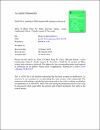Shelf-life of smoked eel fillets treated with chitosan or thyme oil

View/
Publisher version (Check access options)
Check access options
Date
2018-03-22Author
ElObeid, TahraYehia, Hany M.
Sakkas, Hercules
Lambrianidi, Louisa
I. Tsiraki, Maria
Savvaidis, Ioannis N.
...show more authors ...show less authors
Metadata
Show full item recordAbstract
The present study examined the effect of natural antimicrobials: Chitosan, thyme oil
and their combination, on the shelf- life of smoked eel fillets stored under vacuum
packaging (VP) at 4°C. Based on sensory odor data smoked eel fillets had a shelf- life
of 35 (control), 42 (thyme treated and >49 (thyme, chitosan-thyme treated) days. The
thiobarbituric acid value (TBA) value of the control eel sample was significantly
higher than the chitosan-thyme-treated eel samples. The use of chitosan singly, or in
combination with thyme oil reduced lipid oxidation (TBA) of the smoked eel samples.
A trimethylamine nitrogen (TMA-N) value of 10 mg N/100 g, could be suggested as
an indication of smoked eel spoilage initiation. Control and treated eel reached total
volatile basic nitrogen (TVB-N) values of 13.1-31.5 mg N/100 g below the maximum
permissible level of TVB-N in fish and fishery products. Eel samples reached the
value of 7.0 log cfu/g (Total Plate Count,TPC) on days 35 (smoked) and 42 (thyme
treated), whereas both chitosan and chitosan-thyme treated eel samples never reached
this limit value. Results of our study show thyme or chitosan (singly, or in
combination) inhibit the growth of mesophilic bacteria and extend the shelf- life of
smoked eel.
Collections
- Human Nutrition [458 items ]


